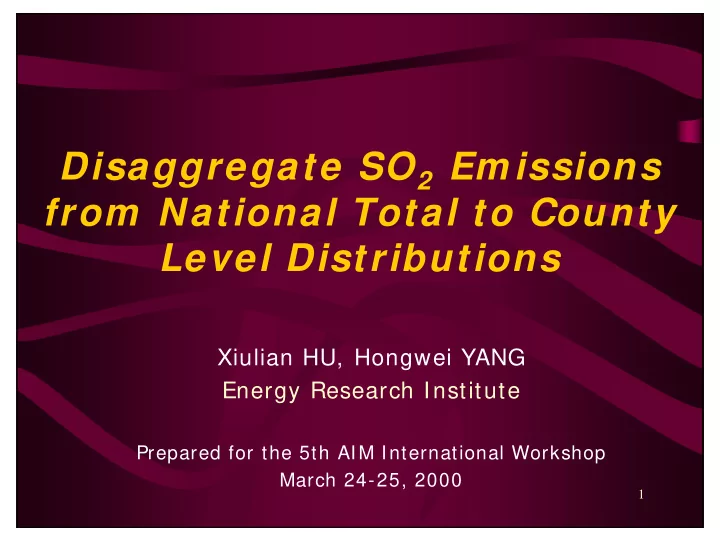

Disaggregate SO 2 Em issions from National Total to County Level Distributions Xiulian HU, Hongwei YANG Energy Research Institute Prepared for the 5th AIM International Workshop March 24-25, 2000 1
1 . I ntroduction • LPS data are based on ERI’s LPS database - X. HU, Project Report, 1998, 1999 • Published statistical materials - State Statistical Year Books - State Environmental Statistical Yearbooks - Energy Statistical Year Books - Transport Statistical Year Books - Urban Statistical Yearbooks - Economic Statistics for Rural Regions - Provincial Statistical Year Books - etc. 2
2 . Structure The disaggregates consist two hierarchies: • From national total to provincial level • From Provincial level to county level 3
2 . Structure LPS : location (county level) Area Sources: AS Total National Provincial Residential Transport Industrial & others ( 3 2 ) County Level Residential Transport Industrial & others ( 2 1 3 5 ) 4
2 . Structure • National: Total = LPS + AS Total = I ndustrial + Non-Industrial • Provincial: Total = LPS + AS AS = Residential + Transport + Industrial&others • County: (2135 = 1693 + 442) Total = LPS + AS AS = Residential + Transport + Industrial&others 5
3 . Methodology 3.1 National --> Provincial (1) Provincial Total 6
3 . Methodology (2) Provincial AS 7
3 . Methodology 3.2 Provincial --> county: Disaggregate AS (1) Residential: Further classification at provincial level 8
3 . Methodology (1) Residential: to county level 9
3 . Methodology (2) Transport 10
3 . Methodology (3) Industrial & others Statistics of economic outputs of LPS enterprises in a county are independent from the county’s statistics, as the ownership is outside the county. 11
3 . Methodology 3.3 Disaggregate result To summarize, SO2 emissions in a county can be obtained from the above disaggregates: 12
The Application of I DRI SI -3 2 System to I nventory Study Hongwei YANG Energy Research Institute Prepared for the 5th AIM International Workshop March 24-25, 2000 13
I . System I ntroduction • GIS + Image Processing • Raster image layers and vector layers - Raster: a fine matrix of cells (spatially continuous data) - Vector: a set of points (distinct features:location, boundary,etc.) 14
I . System I ntroduction • Idrisi32 Overview: Main interface program (menu, tool bar system) + 200 program modules (input, display, analysis) 15
I I . System Requirem ents • Pentium-based PC (Pentium II or III recommended) running Windows NT, 2000, 95 or 98. • A minimum display size of 800x600 SVGA resolution is needed, although 1024 x 768 or more with 64,000 colors is recommended. • Requires a minimum of 16MB RAM, but 32 or greater is recommended. • Program requires 75MB hard disk space. Hard disk requirements for data will depend on individual projects. 16
I I I . Steps 1. Prepare input database: MS Access Tables 17
2. Set default working directory: File = = > Data Paths 18
3. Input Data: Data Entry ==> Database Workshop ==> File ==>Open 19
4. Collect Data : Data Entry ==> Collection Editor ==> File ==>New 20
5. Launch the Image : Display ==> Display Launcher 21
I V. Vector Files • Vector files represent the distinct features of a specific place or region. • Vector files are suitable for inventory studies. • Idrisi32 supports 4 kind of vector files: 1. Point files 2. Line files 3. Polygon files 4. Text files 22
I V. Vector Files 1. Point Files : to represent features for which only the location (as a single point location designation) is of importance. As an example, each LPS can be represented by a point. 23
I V. Vector Files 2. Polygon Files : to describe area features such as forest stands or census tracts. Area source emissions and total SO 2 emissions in a region are of area features and can be represented by polygon files. 24
I V. Vector Files 3. Text Files : to represent text captions that can be displayed as a layer on a map. As an example, county names are displayed in each region. 25
I V. Vector Files 3. Text files 26
I V. Vector Files 4. Line files : to describe linear features such as rivers and roads. 27
V. China’s I nventory Maps 28
29
30
31
32
33
34
VI . Follow -up Studies • Combine SO2 control with CO2 abatement CO2 CO2 Abatem ent Em issions Technology AI M Database Energy SO2 Control Consum ption Applications: - CDM - Local Environm ent I ssues 35
36
Recommend
More recommend